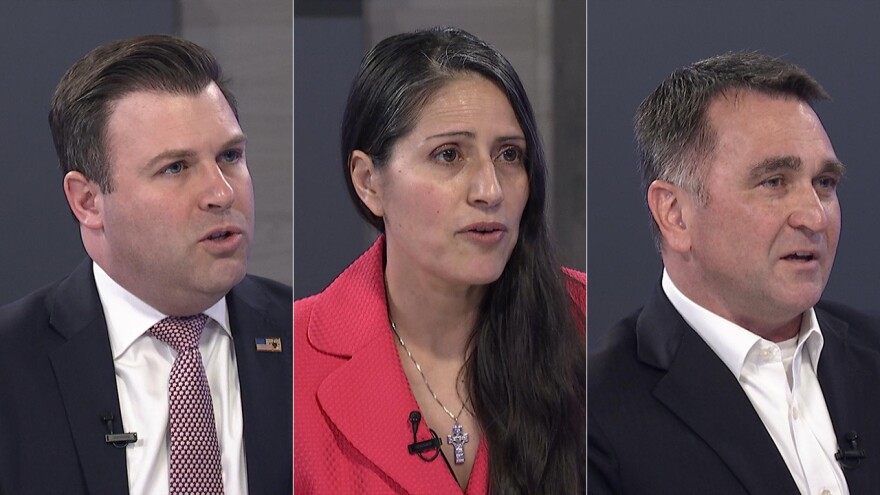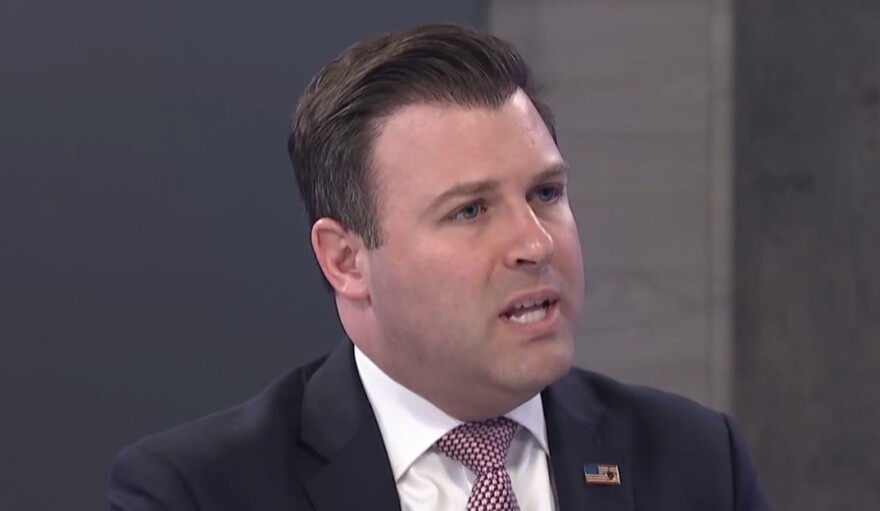BETHLEHEM, Pa. — When Ryan Mackenzie cruised to victory in the Republican primary for Pennsylvania's 7th Congressional District last week, it was the payoff of years of patience and networking — and months of planning.
Unofficial results from the Pennsylvania Department of State show Mackenzie earned 42.5% of the vote in the three-way race against Kevin Dellicker (34%) and Maria Montero (23.3%).
Mackenzie won across the region, eking out close wins in Northampton and Carbon counties and handily winning the district's small portion of Monroe County.
But Mackenzie ran up the score in his home Lehigh County, where he won 49% of the vote — 11 points better than Dellicker, who finished second.
An analysis of voting precinct tallies by LehighValleyNews.com shows that while Dellicker won the rural northern municipalities of Lehigh County, Mackenzie carried the more populated suburban and urban communities to the south.
A state lawmaker for 12 years, Mackenzie saw his strongest support in his home 187th House District, which includes Alburtis and Lower Macungie Township.
"That's a reflection of the job that I've done as a state representative," the Lower Macungie Township resident said in an interview Thursday.
"I think the voters know where credible sources are and want to hear directly from the candidate themselves on the positions."State Rep. Ryan Mackenzie, Republican candidate for U.S. House
But Mackenzie credited his win to his team of volunteers that he said canvassed for his campaign in every county and municipality in the district. For his state House campaign, he'd personally knock on every door he could in election season, he said. But no effective candidate can accomplish that alone in a congressional district with approximately 764,800 people.
About 100 people attended his primary Election Night party in Lower Macungie; each of them had knocked on doors or worked the phones on his campaign's behalf, he said.
"It becomes actually impossible to get to everybody myself. You do have to rely on an army of grassroot supporters," he said.
Veteran campaigner
Christopher Borick, a political science professor at Muhlenberg College who observed the race, said the experience Mackenzie developed campaigning and networking as a state legislator clearly paid off.
Mackenzie has eyed a congressional run since at least 2017, and he had the name recognition and resources in place to pull out a comfortable victory. Dozens of local municipal officials endorsed him, as did lawmakers from across Pennsylvania.
"He's worked with lots of these folks for a decade-plus. That shouldn't be minimized in terms of your organizational structure, the get-out-the vote-structure," Borick said.
Borick also credited Mackenzie with running a focused campaign. Unlike his opponents who had never held office, he had a voting record that drew attacks to his right flank.
A pop-up super PAC criticized his vote in 2019 for Act 77, which greatly expanded mail-in voting. So did conservative donor Bill Bachenberg, who also noted state spending had grown during Mackenzie's tenure.
"He's worked with lots of these folks for a decade-plus. That shouldn't be minimized in terms of your organizational structure ...," Borick said.Christopher Borick, Muhlenberg College political science professor
But Mackenzie stuck to his message and never lost sight of his target audience, Borick said.
His messaging during debate performances, cable news appearances and social media posts courted the conservative base of the Republican Party, Borick said. Mackenzie made clear his support for former President Donald Trump, constantly attacked Democrats such as President Joe Biden and U.S. Rep. Susan Wild — his November rival —and honed attention on the southern border and inflation.
"You could see great attention to the positions that might win favor with the right section of the Republican Party, with the most ideologically conservative section of the primary," Borick said.
Mackenzie downplayed the effect of the attacks. The super PAC, Integrity Leadership Fund, had ties to registered Democrats and is now openly supporting Wild, the Democratic incumbent. He never heard from Republican voters who bought into the attacks, he said.
"I think the voters know where credible sources are and want to hear directly from the candidate themselves on the positions," Mackenzie said.

Outside support
A massive outpouring of support from outside the district likely didn't hurt his chances either.
Americans For Prosperity Action, a super PAC founded by conservative mega-donor Charles Koch, has spent $419,591 on Mackenzie's behalf this cycle, according to campaign finance reports. The nonprofit Open Secrets reports Mackenzie has received more indirect support from Americans For Prosperity Action than any other U.S. House candidate in the nation.
The total amount from Americans for Prosperity Action is likely incomplete; it has not yet reported its spending in April, when campaigns bulk up their get-out-the-vote efforts. Campaign finance reports show it financed mailers, ad buys and canvassing in support of Mackenzie.
Mackenzie acknowledged the support but declined further comment, noting candidates and super PACs are prohibited from coordinating by federal law.
Ashley Klingensmith, a senior adviser with AFP Action, said Mackenzie is the first candidate the group has endorsed and supported in a Pennsylvania primary in its 14-year history. The group knocked on 70,000 doors and made nearly 120,000 phone calls on his behalf dating back to October, she said.
"Ryan was a proven bet when it comes to his votes and a proven bet electorally because he was a winning candidate in the state House," she said.
It remains to be seen if Mackenzie can marshal the support and votes needed to flip the district in November — Wild is seeking a fourth term.
Political observers have labeled Pennsylvania's 7th Congressional District as one of the few toss-up congressional races in the nation. With the U.S. House closely divided along partisan lines, the race between Mackenzie and Wild could determine which party holds the majority.
As a result, both parties and their allies have vowed to invest millions of dollars into the race. As of the beginning of the month, the four candidates had already spent $1.6 million. That figure didn't include spending from outside groups like Americans for Prosperity or Special Operations for America, which supported Dellicker with $30,000.


